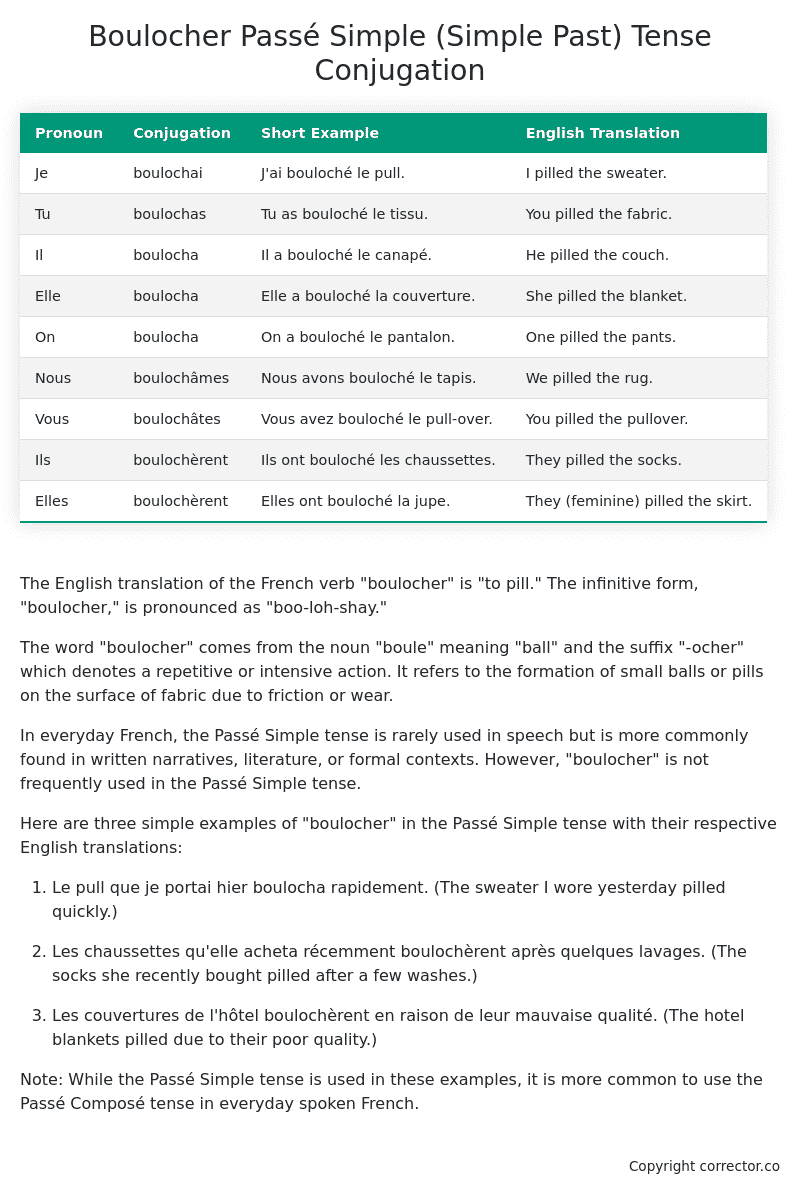Passé Simple (Simple Past) Tense Conjugation of the French Verb boulocher
Introduction to the verb boulocher
The English translation of the French verb “boulocher” is “to pill.” The infinitive form, “boulocher,” is pronounced as “boo-loh-shay.”
The word “boulocher” comes from the noun “boule” meaning “ball” and the suffix “-ocher” which denotes a repetitive or intensive action. It refers to the formation of small balls or pills on the surface of fabric due to friction or wear.
In everyday French, the Passé Simple tense is rarely used in speech but is more commonly found in written narratives, literature, or formal contexts. However, “boulocher” is not frequently used in the Passé Simple tense.
Here are three simple examples of “boulocher” in the Passé Simple tense with their respective English translations:
-
Le pull que je portai hier boulocha rapidement.
(The sweater I wore yesterday pilled quickly.) -
Les chaussettes qu’elle acheta récemment boulochèrent après quelques lavages.
(The socks she recently bought pilled after a few washes.) -
Les couvertures de l’hôtel boulochèrent en raison de leur mauvaise qualité.
(The hotel blankets pilled due to their poor quality.)
Note: While the Passé Simple tense is used in these examples, it is more common to use the Passé Composé tense in everyday spoken French.
Table of the Passé Simple (Simple Past) Tense Conjugation of boulocher
| Pronoun | Conjugation | Short Example | English Translation |
|---|---|---|---|
| Je | boulochai | J’ai bouloché le pull. | I pilled the sweater. |
| Tu | boulochas | Tu as bouloché le tissu. | You pilled the fabric. |
| Il | boulocha | Il a bouloché le canapé. | He pilled the couch. |
| Elle | boulocha | Elle a bouloché la couverture. | She pilled the blanket. |
| On | boulocha | On a bouloché le pantalon. | One pilled the pants. |
| Nous | boulochâmes | Nous avons bouloché le tapis. | We pilled the rug. |
| Vous | boulochâtes | Vous avez bouloché le pull-over. | You pilled the pullover. |
| Ils | boulochèrent | Ils ont bouloché les chaussettes. | They pilled the socks. |
| Elles | boulochèrent | Elles ont bouloché la jupe. | They (feminine) pilled the skirt. |
Other Conjugations for Boulocher.
Le Present (Present Tense) Conjugation of the French Verb boulocher
Imparfait (Imperfect) Tense Conjugation of the French Verb boulocher
Passé Simple (Simple Past) Tense Conjugation of the French Verb boulocher (You’re reading it right now!)
Passé Composé (Present Perfect) Tense Conjugation of the French Verb boulocher
Futur Simple (Simple Future) Tense Conjugation of the French Verb boulocher
Futur Proche (Near Future) Tense Conjugation of the French Verb boulocher
Plus-que-parfait (Pluperfect) Tense Conjugation of the French Verb boulocher
Passé Antérieur (Past Anterior) Tense Conjugation of the French Verb boulocher
Futur Antérieur (Future Anterior) Tense Conjugation of the French Verb boulocher
Subjonctif Présent (Subjunctive Present) Tense Conjugation of the French Verb boulocher
Subjonctif Passé (Subjunctive Past) Tense Conjugation of the French Verb boulocher
Subjonctif Imparfait (Subjunctive Imperfect) Tense Conjugation of the French Verb boulocher
Subjonctif Plus-que-parfait (Subjunctive Pluperfect) Tense Conjugation of the French Verb boulocher
Conditionnel Présent (Conditional Present) Tense Conjugation of the French Verb boulocher
Conditionnel Passé (Conditional Past) Tense Conjugation of the French Verb boulocher
Conditionnel Passé II (Conditional Past II) Tense Conjugation of the French Verb boulocher
L’impératif Présent (Imperative Present) Tense Conjugation of the French Verb boulocher
L’impératif Passé (Imperative Past) Tense Conjugation of the French Verb boulocher
L’infinitif Présent (Infinitive Present) Tense Conjugation of the French Verb boulocher
L’infinitif Passé (Infinitive Past) Tense Conjugation of the French Verb boulocher
Le Participe Présent (Present Participle) Tense Conjugation of the French Verb boulocher
Le Participe Passé (Past Participle) Tense Conjugation of the French Verb boulocher
Struggling with French verbs or the language in general? Why not use our free French Grammar Checker – no registration required!
Get a FREE Download Study Sheet of this Conjugation 🔥
Simply right click the image below, click “save image” and get your free reference for the boulocher Passé Simple tense conjugation!

Boulocher – About the French Passé Simple (Simple Past) Tense
Formation
Usage
Narration
Historical Context
Interactions with other tenses
Passé Composé
Imparfait
Conditional and Subjunctive
Summary
I hope you enjoyed this article on the verb boulocher. Still in a learning mood? Check out another TOTALLY random French verb conjugation!


